 |
| The directions are appropriate! |
Late last week in response to a question I posted on the meaning of Matthew 22:14: "All (composed of multitudes or the many) are called but few are chosen" within the context of the parable this saying concludes. In that post I also just added the translation Richard Rohr supplies in the book I began today: [[I am calling all of you, but so few allow yourselves to be chosen.]] The book is entitled,
Immortal Diamond, The Search for our True Self, and I would recommend it for Lenten reading.
But as I read on from this first quotation, Rohr made an interesting assertion and observation which ties into the comments I made about chosenness and the call to see that everyone is chosen, everyone is special, everyone is called to a spousal relationship with God in Christ. Rohr is also very clear that elitism is contrary to true spirituality and the Christian Gospel. We are called on to believe a paradox; indeed we are ourselves a paradox, both completely unique and wholly the same as everyone else in terms of destiny and call. (Variations on this include the notions 1) that only some are called to exhaustive intimacy with God, and 2) that for this reason one can become truly holy only in a convent or monastery, but not in the secular world.) He writes: "Outer spiritual believing tends to say 'only here' or 'only there', while authentic inner knowing tends to say, 'Always and everywhere.' . . . Outer authority told us we were indeed special (that's the only way to get started), but maturing inner authority allows us to see everyone is special and unique, although it usually takes the maturity of the second half of life to see this. Young zealots still think it's all about them."
One Experience, Two Truths
In the prayer experience I described partially a couple of posts ago (cf.
Notes
from Stillsong Hermitage: Once Again: On Infused Contemplation, Union With God,
and Elitism) two impressions were especially unforgettable and seem to me today to be the bedrock of objective truth in my own life, and I suspect, the objective truth of the life of every human being. In Rohr's work on the True Self, both of these elements figure largely in his analysis. The first truth turns on my sense that God was entirely delighted that I was "finally" there and that he had waited for SUCH a long time for this. Note well that I had not done anything much different than I always did in prayer; there were no elaborate preparations and I certainly had not had to travel somewhere or do or learn something special to "get to" this place --- helpful as those things sometimes are. All of this happened as I sat quietly with my director, my hands resting in her own open hands, but in my own living room.

Similarly, I needed no post-grad courses in theology or special workshops in spirituality to teach me techniques to locate or travel to this place. The meeting with God was a matter of allowing myself to let go of fear and to move into my own heart; it was a matter of experiencing what was and is the essence of my True Self, namely, the profound communion with God I am most really and which I am called to let define everything I am and do. This communion occurring deep in my own heart helps make sense for me of an enigmatic story from the Desert Fathers and Mothers. You probably have heard it yourself. When one of the desert Fathers is asked what a disciple who is faithful to prayer and penance and the desert horarium needs still to do, he holds up his fingers, waves them back and forth, and says, "You can become all flame." We are not called merely to say prayers or to pray but to become prayer, to become all flame, to discover and become the communion with God we truly are.
Thus, I should also note that in this prayer experience I came home to myself, and I discovered that that was something I carried within myself all the time. This realization is part of the essence of Christian peace or Jewish shalom. It is what Jesus knew so well and what allowed him to live the poverty and marginality he did, to have no place to call his own, no place to lay his head and yet, be rich, centered, and completely at home wherever he went as well as compassionate and loving with whomever he dealt. Each of us is asked to recognize that "home" (what Rohr calls the true self) is a celebratory event within us where God and our selves cannot be teased apart; thus heaven exists proleptically within us in this way. Just as God is a trinitarian communion, so are we at our core a communion with God. This communion IS our true self and it is the essence of the human heart. If we are not feeling at home, if we are anxious and insecure, I think we must recognize that this ALWAYS happens
to the extent we are separated from this core communion and live instead from our false selves. Quite often that means looking, often frantically and desperately for home apart from that core communion which constitutes us. The focus of Lent is on dealing with the separation from this communion that exists in our lives, but more about that later.
The second truth associated with the prayer experience I described, and part of the bedrock of personal truth I hold onto and try to live out more and more fully turns on my impression that while I had the WHOLE of God's attention, concern, love, etc, and while he was completely delighted in this communion we shared, every other person was loved as exhaustively, held God's attention in the same way, delighted God as completely and, in the core of their being
WERE the very same all-consuming communion with God that I am in my deepest core. In my own life, especially in my youth, it was very easy to see myself as different from most others and, in fact, I was encouraged in that whether it was because of intelligence, academic achievement, an interest in classical music (not too common in my neck of the woods in kids my age!), musical talent, etc. Later other things supported and encouraged this way of seeing reality too: religious vocation and separation from that, chronic illness (and a unique or at least very rare form of that as well!), an eremitical vocation, etc, etc. Our culture supports and nurtures this often merely-worldly way of seeing reality, this way of measuring and categorizing it which ignores the other side of the paradox. And in some ways, both legitimately and illegitimately, so do dimensions of our Church.
But prayer does not. God does not. A sound theology of the self does not. An inspired theology of vocation does not support or nurture this way of seeing reality or living our lives. Instead they call us to recognize our specialness while we recognize the same (and sameness!) in everyone else. More, they call us to recognize that God's love for us is what constitutes us as both special and the same as others. After all, God, as my prayer experience taught me, is great enough to hold these two parts of a profound paradox together without conflict. If that is so, then so must I and so must the Church, both as People of God, and the institution we identify with hierarchy --- or we cease to be true to ourselves and live from the false self rather than the true. Spirituality is about living and learning to live this foundational paradox.
The focus of Lent

The focus of Lent is therefore a perfect opportunity to take hold of this paradox. Penance, Prayer and almsgiving are all meant to allow us to embrace the deepest truth of ourselves and of others more fully. Penance demands we identify the areas of our lives which support the life of the false self. In terms of this post it is any discipline which helps us attend to what causes us to seek home (rest, peace, shalom, quies) apart from communion with God right where we are. It is any discipline, or practice which helps strip away whatever prevents us from becoming all flame (true self, communion with God). It is any discipline or practice which assists us in overcoming the separation which exists between us and others
because we cannot and will not see others as essentially the same as ourselves. It is any practice which helps us to pray our lives and become the living prayer God made us to be.
Prayer will both remind us of our separation from our true selves (the communion which exists at the heart of our being) and allow God to draw us more fully into that reality. It is the most fundamental way we become one with ourselves, with God, and with others. If it becomes a way of setting ourselves apart or distinguishing ourselves, then we have perverted it and should talk to someone who can assist us in this. Ideally, almsgiving is the opportunity to share our own specialness and gifts in a way which convinces others of their own specialness and gifts. We give not only because others have needs, but because we are convinced those others are every bit as special in this world, and certainly in God's Kingdom, as we are. It reminds us of our relation to others, and of the delight God experiences in loving them. If our almsgiving separates us from others, if it reinforces senses of our own superiority and essential difference from others, then what was a near-occasion of grace has become instead at least a near-occasion of sin. (If we take on almsgiving to assert our difference and supposed superiority, it has crossed over into actual sin.)
The Call and Permission of Desert Spirituality

Like Jesus who was drawn into the desert by the Holy Spirit so that he could commune with God and consolidate his truest, deepest identity, Lent is given to us so we can, for just the space of 40 days, cut ourselves loose from the ways the world demands we see, establish, and identify ourselves and entertain a different truth, a more eternal identity, a more authentic self. The Church calls us to this, but more, her call gives us a freeing permission to do this while the world is clamoring that we embrace something else entirely. Lent is a chance for us to move from simply being called, remarkable as that is, to letting ourselves be God's
chosen ones. It is an opportunity to make the paradox, "I am infinitely special and called to eternal communion with God; everyone is infinitely special and called to the same exhaustive and eternal communion with God" the bedrock upon which we live our lives. It is an opportunity to discover our truest at-homeness exists deep within us and is something we can live out even as we are profoundly marginalized in terms of the world. My prayer is we each find significant ways to let this Lenten opportunity grasp and transform us.







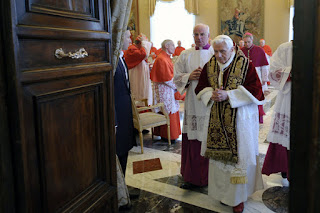

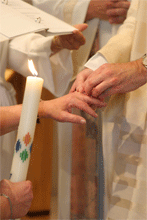








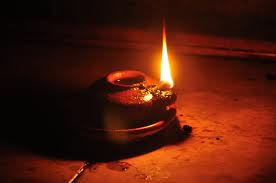



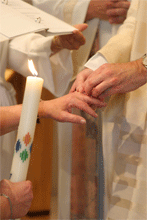






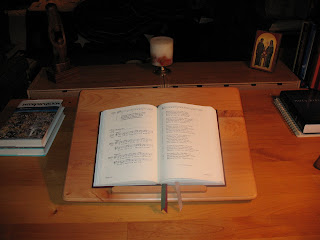














.jpg)
























